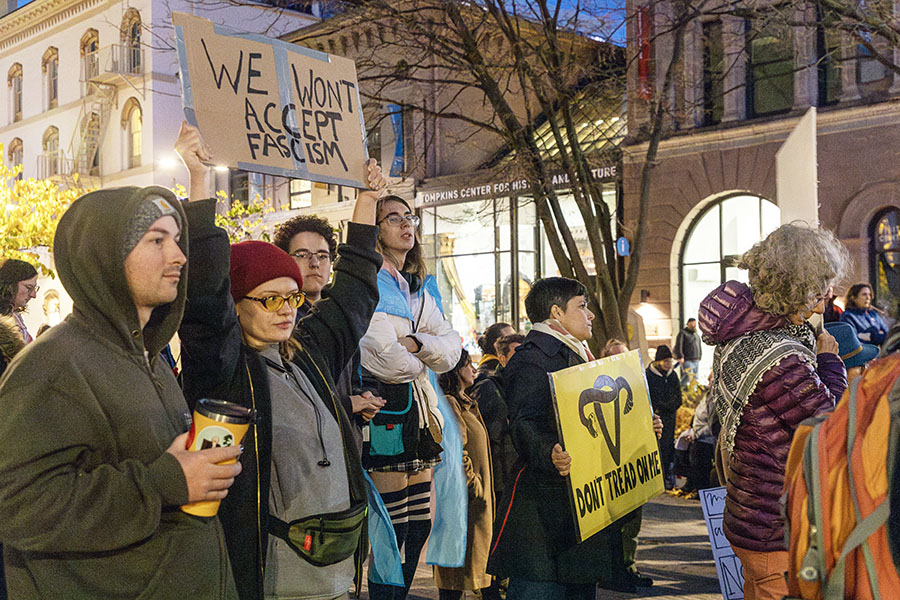President-elect Donald Trump will become the 47th president of the United States after winning both the electoral and popular vote in the 2024 presidential election. In the wake of the results of the election, many local groups in the city of Ithaca are expressing concerns about the implications of Trump’s second term.
On Nov. 8, local groups marched from Ho Plaza at Cornell University to The Commons for a rally called Unity Against Fascism.
Fascism is a system of government marked by centralized authority under one figure, a capitalist economy susceptible to government control, suppression of political opposition and a policy of aggressive nationalism and racism.
Cornell first-year student Sam Poole, campaign committee chair for the Cornell Young Democratic Socialists of America, opened up the demonstration by asking the crowd to describe how the results of the election made them feel.
“Call out a word that describes how you’ve been feeling or what brought you here,” Poole said.
Shouts of “angry,” “mad” and “afraid,” among many others, rang out from the crowd.
Graduate students union
Maggie Foster, a member of the Cornell Graduate Students Union, said she is concerned about grad students workers’ rights under the Trump administration. In 2019, the National Labor Relations Board under the Trump administration threatened graduate student workers’ right to unionize by proposing a rule that would limit the rights of graduate students at private universities to organize and collectively bargain. The rule was withdrawn under the Biden administration.
Foster said the CGSU will continue to fight for better working conditions despite possible anti-union appointments Trump could make to the NLRB.
“The purpose of a union is not just a good contract,” Foster said. “It’s building solidarity and community so that when fascism is on the rise, we turn to each other, we keep us safe. That always has been and will remain CGSU’s mission regardless of who is in power in D.C.”
Project 2025, a presidential transition project led by The Heritage Foundation — a D.C.-based conservative think-tank — is a 900-page policy list designed for the second Trump term. While Trump has denied any relation to the project, vice president-elect JD Vance wrote the foreword for Project 2025.
Chapter 18 of Project 2025 calls for stripping away numerous worker and union protections and reversing progress in diversity, equity and inclusion in labor policy.
“This is in direct opposition with CGSU’s organizing priorities,” Foster said. “We at CGSU are fighting for strong protections against workplace discrimination on the basis of race, national origin, sexual orientation and gender identity, among others.”
Environment
Sunrise Ithaca, a local chapter of the national youth-led Sunrise Movement, helped pass the Ithaca Green New Deal in 2019. Ace Dufresne, leader of Sunrise Ithaca and junior at Ithaca High School, said the group would continue to push for sustainable energy policy in Ithaca through local government.
“I think people often forget that the federal government isn’t the only [form of] government that exists,” Dufresne said. “We have very strong state-level climate legislation, especially those representing our district … and on the local level, we have really strong climate legislation like the Green New Deal.”
After passing the Ithaca Green New Deal, Ithaca became the first city in the U.S. to commit to replacing all fossil fuel infrastructure with electric equivalents within a decade, according to WSKG. As of now, the full implementation of the Green New Deal is not on track to be completed by 2030.
Dufresne said he believes young people need to get involved in their local governments, and that the youth should have a voice. He said a goal would be to get youth positions on climate committees.
“It’s our future,” Dufresne said. “It’s our city.”
Democrat Lea Webb was reelected as the state senator for New York State Senate District 52. Webb helped pass the fracking ban in March in New York state and has expressed support for clean air and drinking water measures as well as renewable energy development.
Trump said he will appoint former Republican Congressman Lee Zeldin as the head of the Environmental Protection Agency. Zeldin opposes the fracking ban in New York and has voted against climate laws put forward by the Biden administration.
Mike Sigler, Republican Tompkins County legislator, who ran against Webb, said he hopes for her to change her views on energy. Sigler said he believes the state is heading in the wrong direction with energy policy.
“It’s not as easy as [saying] we’re going to do renewable [energy sources],” Sigler said. “You can’t rely on solar in February in upstate New York. … It’s not a matter of snow or cold or anything like that, it’s really that we have about nine hours of daylight.”
Local involvement
In Tompkins County, 74.6% of the votes cast in the 2024 presidential election were for Harris, according to the Associated Press. In surrounding counties like Cayuga, Seneca, Tioga and Cortland counties, between 50–62% of voters voted for Trump.
Despite high support for Harris from Tompkins County, New York state as a whole slightly shifted to the right, with Harris getting fewer votes than both President Joe Biden in 2020 and Hillary Clinton in 2016. Sigler said he believes Trump’s increased support in New York is due to the Democrats shifting further to the left.
“I think the Republicans are starting to go to areas and communities they maybe hadn’t gone to in the past,” Sigler said. “We have a pretty strong Democratic Socialist Party here, but that doesn’t play very well outside Tompkins County.”
Poole said Trump’s win could be explained by Harris’ attempt to win over moderate and Republican voters by walking away from progressive positions she previously held. Harris’ positions on fracking, the electric vehicle mandate, and decriminalizing border crossing have all changed from those stated in the 2020 primary. Harris also de-emphasized single-payer health care in her campaign.
“I think we need to abandon the idea that we’re going to win by catering to the right by catering to fascists,” Poole said.
In response to people at the Unity Against Fascism rally, Sigler said that calling Trump a fascist is a dangerous exaggeration.
“He may not be the best person in the world,” Sigler said. “He may not be the person that I would want my child to emulate. But calling somebody Hitler is pretty bad. It actually does a disservice to history.”
Donald Beachler, associate professor in the department of politics at Ithaca College, who specializes in U.S. politics and Holocaust and genocide studies, said that one fascist element of Trump was his disregard of the law displayed on Jan. 6, 2021.
“Call it fascism or not,” Beachler said. “I think it proposes genuine threats to traditional American liberty.”
At Ithaca College, the Office of Religious and Spiritual Life (ORSL) organized election grief circles from Nov. 12–14 where the campus community could come and process their feelings after Election Day. Lauren Kelly Benson, director of ORSL, said the office wanted to first focus on people’s current emotions before they move on to future plans.
“Knowing that we have a very queer campus and a lot of BIPOC students, there’s going to be feelings about [the election results],” Benson said. “I think it’s really important to create spaces that are relatively safe. … There are a lot of people who are feeling not just a lack of belonging but a lack of mattering or safety.”
Benson said ORSL staff spent the days following the election going to various offices and spaces where students were looking for support, offering care and community.
“Offer [love and compassion] to your neighbor, and offer it to the greater world,” Benson said. “I just think that whenever and however, we can slow down and be compassionate with ourselves … with our fellow humans … that’s the foundation of how we relate to each other.”

















